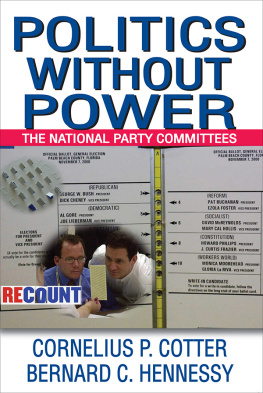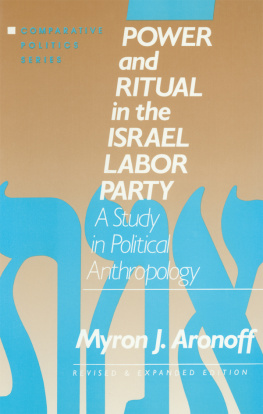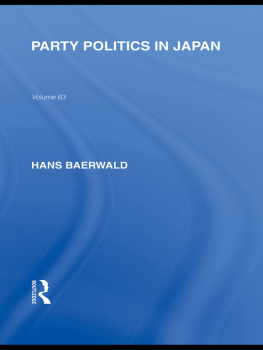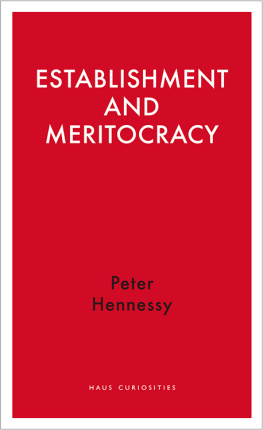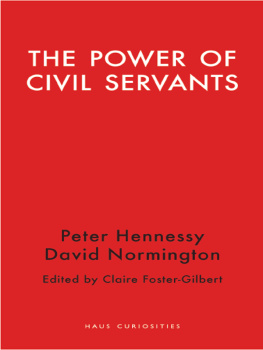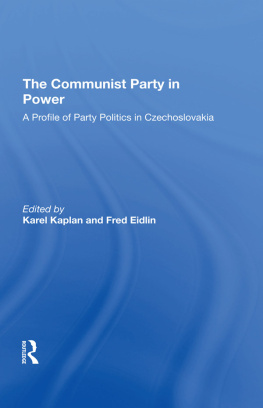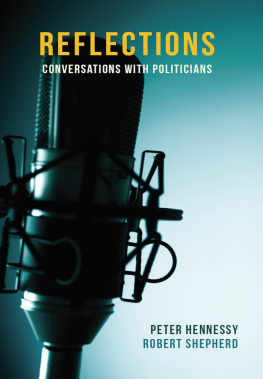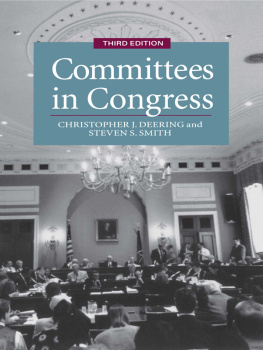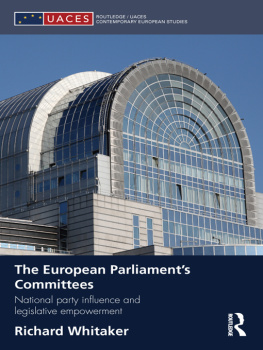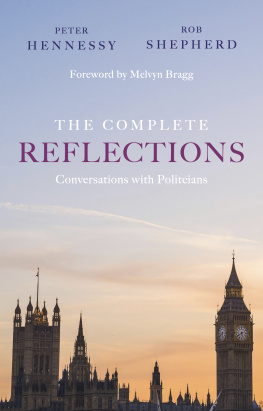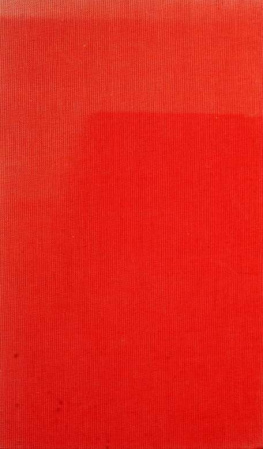First published 1964 by Transaction Publishers
Published 2017 by Routledge
2 Park Square, Milton Park, Abingdon, Oxon OX14 4RN
711 Third Avenue, New York, NY 10017, USA
Routledge is an imprint of the Taylor & Francis Group, an informa business
Copyright 1964 by Taylor & Francis.
All rights reserved. No part of this book may be reprinted or reproduced or utilised in any form or by any electronic, mechanical, or other means, now known or hereafter invented, including photocopying and recording, or in any information storage or retrieval system, without permission in writing from the publishers.
Notice:
Product or corporate names may be trademarks or registered trademarks, and are used only for identification and explanation without intent to infringe.
Library of Congress Catalog Number: 2009016215
Cotter, Cornelius P.
Politics without power : the National Party Committees / Cornelius P. Cotter and Bernard C. Hennessy. p. cm. Includes bibliographical references and index. ISBN 978-0-202-36317-2 (alk. apaer)
1. Political parties--United States. 2. Democratic National Committee (U.S.). 3. Republican National Committee (U.S.). I. Hennessy , Bernard C. II. Title.
JK2265.C67 2009 324.27311--dc22
2009016215
ISBN 13: 978-0-202-36317-2 (pbk)
Preface
Cornelius P. Cotter and Bernard C. Hennessy
A 1946 pamphlet issued by the Republican National Committee is titled "Your Staff at Republican Headquarters." On the cover is a lithograph of the building at 1337 Connecticut Avenue, N.W., which then housed the committee. The twenty-one pages of the pamphlet contain photographs, biographies, and job descriptions for the major staff members and positions. The organization of the committee would be familiar to those who know the present organization with its campaign, finance, labor, publicity, and women's divisions. But what chiefly strikes one about the pamphlet is its institutional look. It creates the impression of a durable institution with a past, a future, and some substancea national party headquarters for a national party. But, despite its well-established and permanent look, as a party headquarters the Republican National Committee is incomprehensible to the foreign visitors who sometimes find their way to it. And, as we point out in , it is very much off the beaten path for the American tourist.
The national committees are bundies of paradoxes. They are our chief symbols of party government, our nearest approximation to party responsibility, the conservators of a national heritage of peaceful change in national politics and administration, substitutes for (rather than carriers of) party ideologies, and yet, withal, pretty much headless, drifting organizations. We repeat in the text the adage about the committees being the umbilical cords between national conventions. The very vagueness and lack of direction of their activities between presidential elections is one of the main sources of staff frustration. And, given a presidential nominee, the likelihood is, as we point out, that, unless he is the incumbent seeking re-election, he will bypass the resources available to him at the national committees in favor of his own campaign organization.
The picture is not pleasing to the responsible party government or the presidential-party advocates of reform. The fault is as much in the ad hoc nature of the American interest in politics as in anything else. That, and the prospect that any notable can make a lateral entry into the parties using the decentralized electoral machinery to create public support and win delegates in the primaries, makes it very difficult indeed for national committee staffers of the party out of power to predict who their next boss will be. The weakness of the position of titular head of the party worsens this condition.
Yet national committees of the two parties may become more than they are today. We hope that this study will help to focus attention on the national party committees and that they may in time become more useful instruments for responsibility in American politics.
The origins of this book are to be traced to our service as National Committee faculty fellows at the two national committees. Hennessy served with Chairman Paul Butler at the Democratic National Committee in 1959, and Cotter with Chairmen Meade Alcorn and Thruston B. Morton at the Republican National Committee in 1959 and part of 1960. In the years that followed we have tried to keep close to developments at the national committees.
Our purpose is simple: to tell who and what the national committees are, where they are located in relation to other politically oriented organizations, what they do, and what modest steps might be taken to make better use of them. The purpose is simple, but the phenomena to be scrutinized are complex, embedded in history, evanescent, and always on the verge of becoming something different. And this, perhaps, is the best reason for seeking to exert some small influence on their future development.
Academicians should read all of this book. Those from the political world might want to start with , although we are presumptuous enough to think that the first two chapters, admittedly somewhat duller than the rest, would not hurt even the old pros.
The distinguished newspaperwoman and author, Helen Hill Miller, deserves great credit and no blame for the development of this study. Acting as executive secretary to the Stern Family Fund, Mrs. Miller introduced the study prospect to the trustees of the Fund, headed by Mrs. Edgar Stern, Sr., who graciously provided support for it.
We hope that in our objectivity or our captiousness we have not offended our many friends at the two national committees. To the chairmen and staffs and to the National Committee faculty fellows who preceded and succeeded us, we are uniquely indebted, as we are to Rhoten Smith, director, and the trustees of the predecessor institution to the National Center for Education in Politics (NCEP), the Citizenship Clearing House, co-sponsor, with the national committees, of the fellowships.
Special thanks are due Ralph Goldman for giving us access to his excellent study of the national party chairmen and American politics and to Robert J. Huckshorn for his critical review of the manuscript at the penultimate stage of its preparation.
Particular and personal debts of gratitude are owed to a few persons who were especially helpful to us. These are Roger Davidson, Maureen Drummy, Roosevelt Ferguson, George Heneghan, Erna Hennessy, and Katherine O'Neil.
The following aided us in gathering data on national committee members : O. Webster Adams, Jr., Charles Backstrom, Donald Balmer, James Browne, John Calpin, Joseph Cerrell, H. Dicken Cherry, Morris W. H. Collins, Dorothy Cline, Wilder Crane, Manning Dauer, John De Grove, Paul Dolan, Alvin Dozeman, William Dunfey, William Frber, Robert Gilmour, Ralph Goldman, George Goodwin, Jean Graham, John Grumm, Royce Hanson, Donald Hayhurst, Donald Herzberg, Robert Horwitz, Mary Evelyn Huey, William Irwin, Dennis Jensen, Malcolm Jewell, Harold Jinks, Donald Johnson, Charles Jones, Conrad Joyner, Wendell Kay, Joseph Kelly, John Kessel, Karl Lamb, Louis Masotti, Nicholas Masters, Donald Matthews, Richard Murphy,


